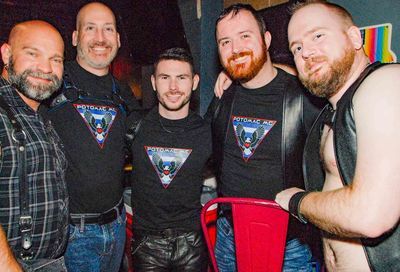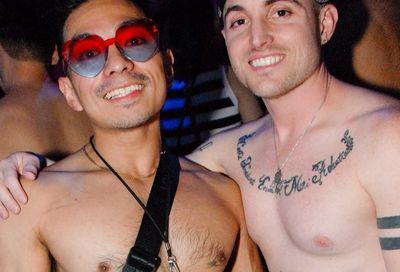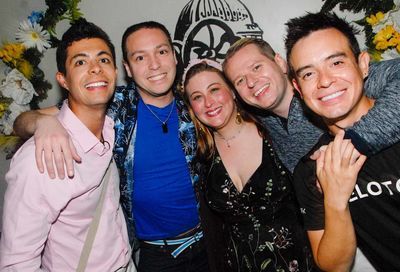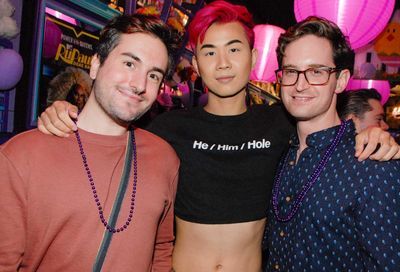Service organizations ready for National Black HIV/AIDS Awareness Day on Feb. 7
Us Helping Us will hold local events promoting HIV awareness and prevention ahead of Friday

“When you think about the HIV epidemic from a black perspective, it’s HIV still affects Black communities with a specific focus on black gay men, as well as black women, and black trans women, with a majority of those infections, about 50%, being in the U.S. South, where a lot of black and brown people live,” says Darwin Thompson, the associate director of corporate giving at Gilead Sciences.
“There are a number of factors that contribute to high incidence of HIV within black communities,” he adds. “Poor trust in the healthcare system, no access to transportation if you’re not in rural America, low education attainment, poverty, poor health literacy. All of those factors can potentially exacerbate the HIV epidemic within communities of color.”
To combat the HIV epidemic, Gilead gives out ad hoc grants to organizations with programs with specific goals or that serve particular communities, such as case management for transgender individuals, outreach to homeless people at risk of contracting HIV, or educational initiatives that promote pre-exposure prophylaxis as a form of prevention.
“We work at a number of partners, and we look at a number of different things that we can do that will increase access to care, increase education around comprehensive prevention tools with a focus on biomedical prevention,” Thompson says. “But then also just supporting communities most at risk for HIV.”
One of Gilead’s initiatives, known as COMPASS, is a hundred million-dollar, 10-year commitment focused on ending the HIV epidemic in the South, particularly among African-Americans and other communities of color.
As part of the initiative, Gilead invests in local organizations in the South that are on the frontlines of the epidemic, specifically those that seek to combat the spread of HIV by tackling mental health, the social stigma that can be associated with getting tested for HIV (and other STDs), and increase various organizations’ capacity building, or the process by which they can do address their weaknesses to improve on the delivery of the services that they offer.
“We work with what we consider to be three critical partners that we call coordinating centers, to whom we provide the funding in order to have them make sub-grants to local organizations,” says Thompson. “The reason we do that process is we feel like we’re a larger entity, and those partner organizations have a better reach within the community and can provide better on-the-ground support to the sub-grantees than we could from Foster City [Gilead’s headquarters].
“We work with Houston School of Social Work in Houston, Texas as our coordinating center for mental health and trauma-informed care,” Thompson says. “We also work with the Southern AIDS Coalition in Birmingham, Alabama, which is our coordinating center for stigma reduction initiatives. And we work with the Emory School of Public Health as our coordinating center for capacity building.”
In late 2019, Gilead launched its TRANScend Community Impact Fund, which recently selected 15 organizations that specifically serve the transgender community to receive a portion of $4.5 million over a two-year period, earmarked for those organizations’ HIV prevention or testing programs.
The company also has an initiative called Age Positively, which gives $17.5 million over a three-year period to 30 organizations focusing on combating the HIV epidemic among populations over 50.
“The data shows that by 2030, the number is over 50% of people living with HIV will be over 50,” Thompsons says.

He notes that the organizations that receive the money include not only those that work to provide coordinated health care for older people at risk of HIV, but others that promote healthy living or have programs, ranging from support groups to activities such as playwriting workshops and cooking classes, intended to combat the social isolation that can be widespread among people over 50 who are living with HIV.
One of those organizations supported by the Age Positively initiative is Us Helping Us, People Into Living, Inc., a D.C.-based organization whose programs are designed to promote healthy living and reduce the impact of HIV/AIDS among black people, particularly black gay men and other communities threatened by HIV. The organization is specifically using the funding it has received through the Age Positively initiative to serve older black people living with HIV in the D.C. area.
Beyond its services for older individuals, Us Helping Us has planned a number of events in the D.C. area this week aimed at promoting National Black HIV/AIDS Awareness Day, which occurs on Friday, Feb. 7.
“We are doing a lot of community education and mobilization, trying to increase awareness around HIV and other sexually transmitted infections in under-served communities and communities that basically carry the greatest burden of disease and, in particular, the HIV epidemic,” says DeMarc Hickson, the executive director of Us Helping Us, People Into Living, Inc.
On Jan. 29, the organization took a mobile testing unit to Baltimore, where it conducted HIV and STD screenings and handed out educational information about people within the community. It has also been running ads promoting its efforts on local radio stations, and has an ongoing relationship with some historically black universities and colleges or predominantly black institutions in the D.C. area, such as Howard University, Bowie State University, and Prince George’s Community College, where it offers regularly occurring HIV/STD testing.

“On Feb. 5, we will be hosting an Awareness Day at Bowie State, an all-day event where we will basically be having a cookout on their campus, or on the yard, as we say,” Hickson says. “We’ll be offering food and conducting integrated HIV and STD screening.
“On Thursday we’re having a community appreciation event at our D.C. office, from 3 p.m. to 5:30 p.m., to raise awareness in the community,” he adds. “Again, we will have free food, music. We’re actually looking to work with one of the local radio stations and have them broadcast live from this office location.”
On Feb. 7, Us Helping Us will hold a similar event on Howard University’s campus from 11 a.m. to 3 p.m., working with the on-campus student health center to perform HIV/STD screenings and passing out literature, novelty kits, condoms, lubricants, and anything else designed to increase students’ literacy around sexual health.
“I think that National Black HIV/AIDS Awareness Day is an opportunity for us to educate the community about how HIV disproportionately impacts multiple segments of the black community, and to highlight that not only do black gay and bisexual men carry the greatest burden of HIV, but also black cisgender and transgender women,” says Hickson.
“This allows us to do a little bit more laser-focused attention on segments of the community that are disproportionately impacted by HIV,” he adds. “It helps us to highlight the things that we are doing, and the successes that we have made, but also to inform the community of the long way that we still have to go to eliminate the HIV epidemic in the black community.”
Us Helping Us’ Awareness Day at Bowie State University is on Wednesday, Feb. 5, starting at 11 a.m. at the Student Center, 14000 Jericho Park Rd., Bowie, Md. For more information, visit www.ushelpingus.org.
The organization’s Community Appreciation Day is on Thursday, Feb. 6 from 3-5:30 p.m. at Us Helping Us’ headquarters at 3636 Georgia Ave. NW. Call 202-446-1100 to RSVP.
Us Helping Us’ Awareness Day Festival on Howard University Campus is on Friday, Feb. 7 from 11 a.m.-3 p.m. at 2400 6th St. NW. For more information, visit www.ushelpingus.org.
For more information on Gilead Sciences’ various initiatives, visit www.gilead.com/purpose/partnerships-and-community.
Read more:
WATCH: Starbucks airs wonderful pro-trans ad celebrating name recognition
Donald Trump allegedly called journalist with transgender parent “that b***h with the tr***y dad”
Virginia House passes bill banning conversion therapy for LGBTQ minors
Support Metro Weekly’s Journalism
These are challenging times for news organizations. And yet it’s crucial we stay active and provide vital resources and information to both our local readers and the world. So won’t you please take a moment and consider supporting Metro Weekly with a membership? For as little as $5 a month, you can help ensure Metro Weekly magazine and MetroWeekly.com remain free, viable resources as we provide the best, most diverse, culturally-resonant LGBTQ coverage in both the D.C. region and around the world. Memberships come with exclusive perks and discounts, your own personal digital delivery of each week’s magazine (and an archive), access to our Member's Lounge when it launches this fall, and exclusive members-only items like Metro Weekly Membership Mugs and Tote Bags! Check out all our membership levels here and please join us today!






















